#East African Community
Text
The African Union and the Regional Economic Communities
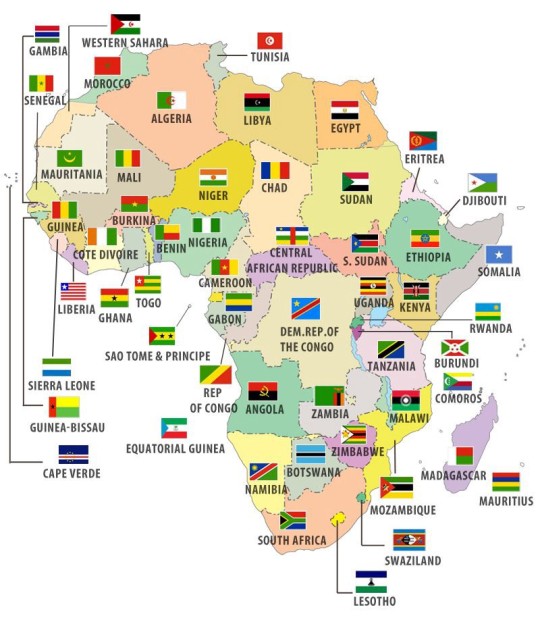
View On WordPress
#African Union#Arab Maghreb Union#Common Market for Eastern and Southern Africa#Community of Sahel-Sahara States#East African Community#Economic Commision Of West African States#Economic Community of Central African States#Intergovernmental Authority on Development#International Confernce on the Great Lakes Region#Regional Economic Communities#Southern African Development Community
3 notes
·
View notes
Text
Somalia officially admitted into EAC
East African Community heads of state attend the 23rd Ordinary Summit of the EAC Heads of State in Arusha, Tanzania on Novemeber 24, 2023. PHOTO | X via @jumuiya
By VINCENT OWINO
Somalia has been admitted as the eighth member of the East African Community on Friday November 24, 2023, just over a year after the latest entrant, the Democratic Republic of Congo (DRC) was admitted into the…
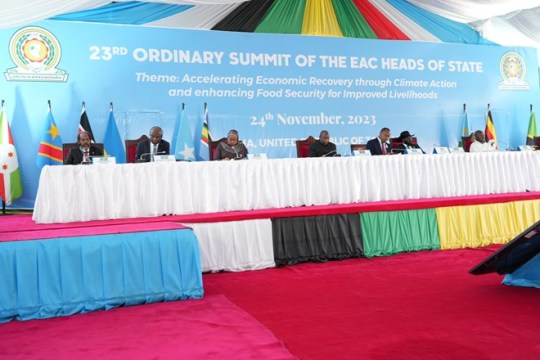
View On WordPress
0 notes
Text
Rant on the Watch 7
I did not do a “rant” last week only because I had done a blog post about the East African Community the expected next-world Superpower. It was a rant of sorts too since the EAC is an insult and the blog post was enough food for those who honestly pass by to read. I am back to rant more because that’s all I can do about the happenings in the world.
This week was lengthy world over after the ICC…
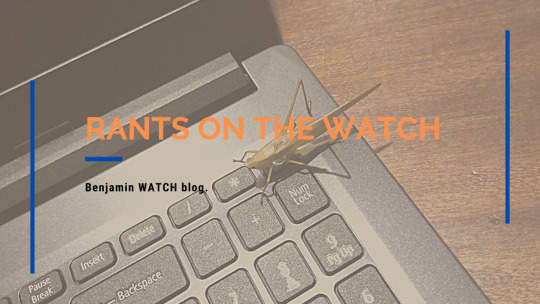
View On WordPress
0 notes
Text
Point de vue ou ligne de conduite ?
Ci-dessous notre proposition d’une ligne de conduite à adopter face à ceux qui nous voudraient réutiliser des méthodes politiques surannées.
Cette négociation constitue un danger pour la nation congolaise. Pourquoi c’est Kagame qui doit toujours être derrière les négociations? Est-ce que les congolais ne peuvent pas se réveiller devant ces genres de tentacules? Pensez-vous qu’après négociation,…
View On WordPress
0 notes
Text
World Food Program suspends food aid to South Sudan over insufficient funds
New Post has been published on https://www.timesofocean.com/world-food-program-suspends-food-aid-to-south-sudan-over-insufficient-funds/
World Food Program suspends food aid to South Sudan over insufficient funds

Nairobi (The Times Groupe)- The UN World Food Program (WFP) on Tuesday has suspended food assistance to South Sudan due to insufficient funding.
According to a statement released in Juba, the WFP’s decision will increase the risk of starvation for 1.7 million people.
Approximately $426 million is needed to reach six million food-insecure individuals by 2022, according to the UN humanitarian organization.
South Sudan, a member of the East African Community, is currently experiencing its “hungriest year” since it gained independence in 2011, with over 60% of the population facing severe food insecurity, a situation exacerbated by the Ukraine conflict and local climate change.
“Humanitarian needs far exceed the funding we have received this year,” said Adeyinka Badejo, acting WFP country director for South Sudan.
“If this trend continues,” she warned, “we will face bigger and more costly problems in the future, including malnutrition, stunting, and disease.”
WFP officials are extremely concerned about the impact of the funding cuts on children, women, and men who will not have enough to eat during the lean season.
According to the latest Integrated Food Security Phase Classification (IPC) assessment, 7.74 million people will experience acute acute hunger during the lean season, which runs from June to August, and 1.4 million children will be critically malnourished.
“These families have exhausted all their coping mechanisms. “They need immediate humanitarian assistance to put food on the table,” Badejo said.
Amid the same budget difficulties, the World Food Program cut food rations in half in September of last year, leaving most households with very little food to eat.
WFP food rations include cereals, pulses, vegetable oil, and salt.
Food suspension aid will also affect 178,000 schoolchildren, who will no longer receive daily school meals, a crucial safety net that helps keep South Sudanese children in school.
#Adeyinka Badejo#Africa Food Crisis#africa news#Africa's Food Crisis#Breaking news from AFRICA#East African Community#Famine In Africa#food news#Food Safety Africa#insufficient funding#Integrated Food Security Phase Classification (IPC)#Latest news from Africa#malnutrition in africa#News And Media From Africa#The Times Groupe#Times Of Ocean#UN humanitarian organization#UN World Food Program (WFP)#Unravel News#Food
1 note
·
View note
Text

Today I decided to share with you my audience and my followers who I am. What I look like is who I am. My face is me. My face showcases who I wanted to look like when I was a kid. I am happy on this picture and I am grateful to have this blog so that I can share my knowledge with the people who align with me.
Happy Sunday everyone ❤️🧡❤️
#astrology community#astro blogger#astrology blogger#astrology#fypツ#sharing is caring#black girl magic#black girl beauty#afro hair#curly hair#face card#astrology observations#astrology notes#vedicknowledge#vedic horoscope#vedic astro observations#fyppage#my followers#east african#west african#african girl
48 notes
·
View notes
Text
-
#Seeing the dune part 2 american centric red carpet and as a devoted aficionado of the books and yk a moroccan person here are my 2 cents#Dune was one of the few Western works inspired by MENA culture that that felt genuine and respectful#But ofc despite the profound symbiosis with Middle Eastern and North African culture evident within the pages of the novels#the movie adaptation lack of substantive representation from these communities both in on-screen portrayals and within production roles was#very much disappointing in part 1 and i doubt there are any change now#While drawing inspiration from the Amazigh peoples of Algeria and Morocco#the film barely skims the surface of its MENA influences leaving substantial potential untapped#Herbert openly acknowledged the profound impact of Islam and MENA culture on his noveIs#from the metaphorical representation of Spice as oil#to the allegorical parallels drawn between the occupation of Arrakis and real-world MENA geopolitics#By marginalizing Arabs from the narrative fabric of Dune the essence of the story is being undermined particularly its anti-colonial core#the irony of this is kiIIing me because this was a direct resuIt of us impérialism on the middIe east#But the reality is that Dune is an American production tailored for an American audience so it makes sense for it to be what it is now#a big production running from its original essence#What adds to my disappointment is the fact that I liked Villeneuve's adaptation of Incendies and I had what you call foolish hope hfhg#Dune feIt Iike a squandered opportunity to authentically depict the cultural milieu that inspired it#Given the narrative's inherent anti-colonial themes#the omission of Arab and North African voices dilute its message if any of it is even left#without representation from Arabs and Amazigh people the cultural essence becomes another appropriated resource watered down to an aestheti#rather than serving as a critique of the destructive actions of colonialists seeking power and dominance#the narrative becomes susceptible to distortion and co-option by the very entities it was intended to condemn and hold accountable
37 notes
·
View notes
Text

🇺🇬🇨🇩 🚨 UGANDA BEGINS WITHDRAWEL OF 1'000 TROOPS FROM PEACEKEEPING MISSION IN DEMOCRATIC REPUBLIC OF CONGO
The Ugandan Military began the withdrawal of 1'000 troops deployed in the east of the Democratic Republic of the Congo for the regional peacekeeping force stationed in the country.
The move comes after Kinasha's Military issued a statement late Friday announcing a decision not to extend the mandate of the East African Community Regional Force (EACRF) beyond Dec. 8th.
According to the statement, the pull-out of Military assets in a phased manner, gradual and orderly, and sequentially deployed in March, 2023 will end on Jan. 7th, 2024.
"UPDF will ensure to expedite the pull-out of its forces and equipment within the approved timelines as enshrined in the extraordinary meeting of EAC CDFS (Chief of Defense Forces) held on Dec. 6," said Capt. Ahmad Hassan Kato, UPDF's contingent spokesperson.
CDF's meetings in Arusha, Tanzania, upheld DRC's decision and recommended to EAC defense ministers that EACRF officially ceases operations in the east African country, with immediate effect from Dec 8th.
Following the decision, Uganda, Burundi, Kenya, and South Sudan deployed troops to the region, which was endorsed and adopted by the regional leaders at the 3rd East African Community Heads of State Conclave on Peace and Security in eastern DRC, held in Nairobi last June.
"Uganda contingent urges all armed groups (in eastern DRC) to facilitate the withdrawal of the UPDF troops by observing total ceasefire so as to allow the forces to exit from the mission area safely," said Kato.
According to the Ugandan Military, other troops deployed to the eastern DRC as part of a joint military operation with their Congolese counterparts will continue the hunt against the Allied Democratic Forces in the region.
Via@XinhuaNews
#source
@WorkerSolidarityNews
#uganda#dr congo#drc#congo#uganda news#drc news#allied democratic forces#eastern congo#democratic republic of the congo#military news#east african community regional force#eacrf#africa#africa news#politics#geopolitics#war#wars#war news#world news#news#african news#east africa#global news#international news#breaking news#current events#global politics#international affairs#international politics
11 notes
·
View notes
Text
learning that women turning into bears was a fairly common story motif from my tribe was the most validating piece of information ive ever received as a artist. im carrying on hundreds of years of tradition by being really loud about my ocs on the internet
#crow.txt#ocposting#the book i was reading also talked about how that motif may have been influenced by african american folklore which is really interesting#a lot of tribes on the east coast intermarried with black communities so cultural exchange was inevitable
41 notes
·
View notes
Text
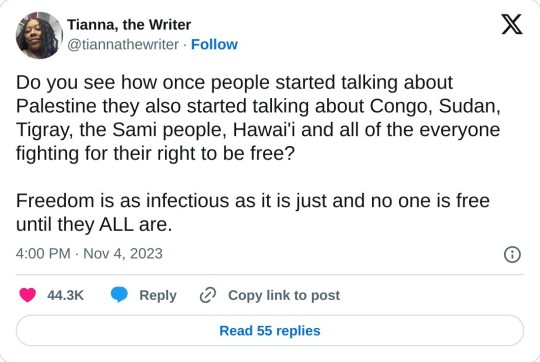
People & countries mentioned in the thread:
DR Congo - M23, Cobalt
Darfur, Sudan - International Criminal Court, CNN, BBC (Overview); Twitter Explanation on Sudan
Tigray - Human Rights Watch (Ethnic Cleansing Report)
the Sámi people - IWGIA, Euronews
Hawai'i - IWGIA
Syria - Amnesty International
Kashmir- Amnesty Summary (PDF), Wikipedia (Jammu and Kashmir), Human Rights Watch (2022)
Iran - Human Rights Watch, Morality Police (Mahsa/Jina Amini - Al Jazeera, Wikipedia)
Uyghurs - Uyghur Human Rights Project (UHRP) Q&A, Wikipedia, Al Jazeera, UN Report
Tibetans - SaveTibet.org, United Nations
Yazidi people - Wikipedia, United Nations
West Papua - Free West Papua, Genocide Watch
Yemen - Human Rights Watch (Saudi border guards kill migrants), Carrd
Sri Lanka (Tamils) - Amnesty International, Human Rights Watch
Afghans in Pakistan - Al Jazeera, NPR
Ongoing Edits: more from the notes / me
Armenians in Nagorno-Karabakh/Azerbaijan (Artsakh) - Global Conflict Tracker ("Nagorno-Karabakh Conflict"), Council on Foreign Relations, Human Rights Watch (Azerbaijan overview), Armenian Food Bank
Baháʼís in Iran - Bahá'í International Community, Amnesty, Wikipedia, Minority Rights Group International
Kafala System in the Middle East - Council on Foreign Relations, Migrant Rights
Rohingya - Human Rights Watch, UNHCR, Al Jazeera, UNICEF
Montagnards (Vietnam Highlands) - World Without Genocide, Montagnard Human Rights Organization (MHRO), VOA News
Ukraine - Human Rights Watch (April 2022), Support Ukraine Now (SUN), Ukraine Website, Schools & Education (HRW), Dnieper River advancement (Nov. 15, 2023 - Ap News)
Reblogs with Links / From Others
Indigenous Ppl of Canada, Cambodia, Mexico, Colombia
Libya
Armenia Reblog 1, Armenia Reblog 2
Armenia, Ukraine, Central African Republic, Indigenous Americans, Black ppl (US)
Rohingya (Myanmar)
More Hawai'i Links from @sageisnazty - Ka Lahui Hawaii, Nation of Hawai'i on Soverignty, Rejected Apology Resolution
From @rodeodeparis: Assyrian Policy Institute, Free Yezidi
From @is-this-a-cool-url: North American Manipur Tribal Association (NAMTA)
From @dougielombax & compiled by @azhdakha: Assyrians & Yazidis
West Sahara conflict
Last Updated: Feb. 19th, 2024 (If I missed smth before this, feel free to @ me to add it)
#resources#important#congo#sudan#tigray#sámi#hawai'i#syria#kashmir#iran#uyghurs#china#tibetans#yazidi#west papua#yemen#sri lanka#afghans in pakistan#pakistan#human rights#palestine#twitter#lmk if there's a better reource or I linked smth wrong. I am very tired#my posts#genocide#social justice#nagorno karabakh#Bahá'í#kafala system#qatar
41K notes
·
View notes
Text
Can the East African Community bring the Rwanda-DRC tension to an end

View On WordPress
#Democratic Republic of Congo#East African Community#M23 rebels#Peace process#President Felix Tshisekedi#President Paul Kagame#President Uhuru Kenyatta#President William Samoei Ruto#Rwanda
1 note
·
View note
Text
The "East African Community" the Joke
Reading time 5 minutes 45 Sec
Speaking time 11 minutes 4 Sec
The East African Community in this write-up I will refer to as EAC, is something I have written about before and I have not changed my perspective about it because of the reality on the ground. The EAC is one of the small parts that are vital for the proper functioning of a United Africa something that is fiction at the moment. The…
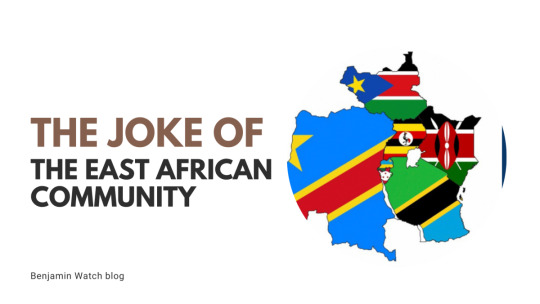
View On WordPress
1 note
·
View note
Text
youtube
Watch the 2024 American Climate Leadership Awards for High School Students now: https://youtu.be/5C-bb9PoRLc
The recording is now available on ecoAmerica's YouTube channel for viewers to be inspired by student climate leaders! Join Aishah-Nyeta Brown & Jerome Foster II and be inspired by student climate leaders as we recognize the High School Student finalists. Watch now to find out which student received the $25,000 grand prize and top recognition!
#ACLA24#ACLA24HighSchoolStudents#youtube#youtube video#climate leaders#climate solutions#climate action#climate and environment#climate#climate change#climate and health#climate blog#climate justice#climate news#weather and climate#environmental news#environment#environmental awareness#environment and health#environmental#environmental issues#environmental education#environmental justice#environmental protection#environmental health#high school students#high school#youth#youth of america#school
18K notes
·
View notes
Text
Please consider spending time to learn more about Afro-Palestinian experiences and living under occupation while Black and Palestinian, along with Afro-Palestinian resistance efforts throughout the years. Here are some valuable articles and resources:
Articles:
In the heart of the Old City, generations of Afro-Palestinians persevere in the face of occupation by Mousa Qous
Putting the pieces together: Fragments of oral history in exile by Samah Fadil
‘Afro-Palestinians’ forge a unique identity in Israel by Isma'il Kushkush
The Africans of Jerusalem by Mousa Qous
The History Of Afro-Palestinians, Past And Present by Fayida Jailler
African-Palestinian community’s deep roots in liberation struggle by Electronic Intifada
Remembering Fatima Bernawi: Historic Palestinian fighter and liberated prisoner (1939-2022) on Samidoun
Fatima Barnawi, founder of Palestinian Women's Police and veteran prisoner, dies at 83 by Middle East Eye
On Fatima Bernawi, Women's Struggle, and Black-Palestinian Solidarity by Elom Tettey-Tamaklo
Afro Palestine: the African Diaspora in Palestine (not an article but a quick video summary of Afro-Palestinian history)
Note: highly recommend checking out Mousa Qous, the founder of the African Community Society, for his writings above all!
African Community Society of Jerusalem:
Their website— organization centered around the Afro-Palestinian community in Jerusalem.
General info about the group
ACS's instagram to learn more about Afro-Palestinian history.
Here is a write-up about the African Community Society, their impact within Palestinian society, and Afro-Palestinian history in Jerusalem specifically. Highly recommend taking the time to read this if you can.
Please take the time to watch this Documentary by Stephen Graham about former Israeli prisoner Ali Jiddah where he takes the viewer on a tour throughout Jerusalem and describes the unique struggles the Afro-Palestinian community face. He is quite a friendly guy and very funny:
youtube
#palestine#palestinian history#palestine history#palestina#stand with palestine#i'll probably add more links as i come across them#Youtube
13K notes
·
View notes
Text
I feel like people have such a limited view of the Shoah as something that killed religious Jews living in Eastern Europe. Certainly, that’s the majority of Jewish deaths from a raw numbers perspective. But that narrow view erases so much suffering.
Imperial Japan was allied to the Nazis, so Jews in East Asia and the Pacific forced to flee or die as Japan expanded their empire. Fascist Spain was sympathetic to the Nazi cause, and it’s not like the Sephardic Jews could easily flee into France after 1940. The Axis powers had colonized Algeria, Iraq, Libya, Morocco, and Tunisia at that point, so North African Mizrahi Jews weren’t spared the horrors. While the US government didn’t directly kill Jews, they denied us refugee status during the Shoah, and they did nothing to prevent the spread of multiple US American fascist parties and white suprematist groups. The Vatican, unofficially allied with Fascist Italy, handed over the names and locations of Jews they had converted to Catholicism decades or centuries prior. Families who didn’t even know they were ethnically Jewish were dragged out of Catholic Churches during Mass and sent to slaughterhouses hundreds of miles away. There were precious few diasporic communities throughout the world where Jews were safe in the 30s and 40s.
The Holocaust spanned entire continents. The Holocaust was global.
Edit 04/02/24: This post wasn’t written about Israel, and you shouldn’t make it about Israel. In either direction. The Shoah should not serve as a justification for the unnecessary abuses of the Palestinian people by the Likud government. Simultaneously, the Shoah was not a “lesson” to be learned by Jews, you cannot make a reasonable comparison between the Shoah and Gaza. This post is not about Israel and Palestine. Do not make it about Israel and Palestine. The deaths of our ancestors are not a tool with which you can make your argument.
2K notes
·
View notes
Text
in addition to being prone to an obvious naturalistic fallacy, the oft-repeated claim that various supplements / herbs / botanicals are being somehow suppressed by pharmaceutical interests seeking to protect their own profits ('they would rather sell you a pill') belies a clear misunderstanding of the relationship between 'industrial' pharmacology and plant matter. bioprospecting, the search for plants and molecular components of plants that can be developed into commercial products, has been one of the economic motivations and rationalisations for european colonialism and imperialism since the so-called 'age of exploration'. state-funded bioprospectors specifically sought 'exotic' plants that could be imported to europe and sold as food or materia medica—often both, as in the cases of coffee or chocolate—or, even better, cultivated in 'economic' botanical gardens attached to universities, medical schools, or royal palaces and scientific institutions.
this fundamental attitude toward the knowledge systems and medical practices of colonised people—the position, characterising eg much 'ethnobotany', that such knowledge is a resource for imperialist powers and pharmaceutical manufacturers to mine and profit from—is not some kind of bygone historical relic. for example, since the 1880s companies including pfizer, bristol-myers squibb, and unilever have sought to create pharmaceuticals from african medicinal plants, such as strophanthus, cryptolepis, and grains of paradise. in india, state-created databases of valuable 'traditional' medicines have appeared partly in response to a revival of bioprospecting since the 1980s, in an increasingly bureaucratised form characterised by profit-sharing agreements between scientists and local communities that has nonetheless been referred to as "biocapitalism". a 1990 paper published in the proceedings of the novartis foundation symposium (then the ciba foundation symposium) spelled out this form of epistemic colonialism quite bluntly:
Ethnobotany, ethnomedicine, folk medicine and traditional medicine can provide information that is useful as a 'pre-screen' to select plants for experimental pharmacological studies.
there is no inherent oppositional relationship between pharmaceutical industry and 'natural' or plant-based cures. there are of course plenty of examples of bioprospecting that failed to translate into consumer markets: ginseng, introduced to europe in the 17th century through the mercantile system and the east india company, found only limited success in european pharmacology. and there are cases in which knowledge with potential market value has actually been suppressed for other reasons: the peacock flower, used as an abortifacient in the west indies, was 'discovered' by colonial bioprospectors in the 18th century; the plant itself moved easily to europe, but knowledge of its use in reproductive medicine became the subject of a "culturally cultivated ignorance," resulting from a combination of funding priorities, national policies, colonial trade patterns, gender politics, and the functioning of scientific institutions. this form of knowledge suppression was never the result of a conflict wherein bioprospectors or pharmacists viewed the peacock flower as a threat to their own profits; on the contrary, they essentially sacrificed potential financial benefits as a result of the political and social factors that made abortifacient knowledge 'unknowable' in certain state and commercial contexts.
exploitation of plant matter in pharmacology is not a frictionless or infallible process. but the sort of conspiratorial thinking that attempts to position plant therapeutics and 'big pharma' as oppositional or competitive forces is an ahistorical and opportunistic example of appealing to nominally anti-capitalist rhetoric without any deeper understanding of the actual mechanisms of capitalism and colonialism at play. this is of course true whether or not the person making such claims has any personal financial stake in them, though it is of course also true that, often, they do hold such stakes.
537 notes
·
View notes
Note
When you tag things “#abolition”, what are you referring to? Abolishing what?
Prisons, generally. Though not just physical walls of formal prisons, but also captivity, carcerality, and carceral thinking. Including migrant detention; national border fences; indentured servitude; inability to move due to, and labor coerced through, debt; de facto imprisonment or isolation of the disabled or medically pathologized; privatization and enclosure of land; categories of “criminality"; etc.
In favor of other, better lives and futures.
Specifically, I am grateful to have learned from the work of these people:
Ruth Wilson Gilmore on “abolition geography”.
Katherine McKittrick on "imaginative geographies"; emotional engagement with place/landscape; legacy of imperialism/slavery in conceptions of physical space and in devaluation of other-than-human lifeforms; escaping enclosure; plantation “afterlives” and how plantation logics continue to thrive in contemporary structures/institutions like cities, prisons, etc.; a “range of rebellions” through collaborative acts, refusal of the dominant order, and subversion through joy and autonomy.
Macarena Gomez-Barris on landscapes as “sacrifice zones”; people condemned to live in resource extraction colonies deemed as acceptable losses; place-making and ecological consciousness; and how “the enclosure, the plantation, the ship, and the prison” are analogous spaces of captivity.
Liat Ben-Moshe on disability; informal institutionalization and incarceration of disabled people through physical limitation, social ostracization, denial of aid, and institutional disavowal; and "letting go of hegemonic knowledge of crime”.
Achille Mbembe on co-existence and care; respect for other-than-human lifeforms; "necropolitics" and bare life/death; African cosmologies; historical evolution of chattel slavery into contemporary institutions through control over food, space, and definitions of life/land; the “explicit kinship between plantation slavery, colonial predation, and contemporary resource extraction” and modern institutions.
Robin Maynard on "generative refusal"; solidarity; shared experiences among homeless, incarcerated, disabled, Indigenous, Black communities; to "build community with" those who you are told to disregard in order "to re-imagine" worlds; envisioning, imagining, and then manifesting those alternative futures which are "already" here and alive.
Leniqueca Welcome on Caribbean world-making; "the apocalyptic temporality" of environmental disasters and the colonial denial of possible "revolutionary futures"; limits of reformism; "infrastructures of liberation at the end of the world."; "abolition is a practice oriented toward the full realization of decolonization, postnationalism, decarceration, and environmental sustainability."
Stefano Harney and Fred Moten on “the undercommons”; fugitivity; dis-order in academia and institutions; and sharing of knowledge.
AM Kanngieser on "deep listening"; “refusal as pedagogy”; and “attunement and attentiveness” in the face of “incomprehensible” and immense “loss of people and ecologies to capitalist brutalities”.
Lisa Lowe on "the intimacies of four continents" and how British politicians and planters feared that official legal abolition of chattel slavery would endanger Caribbean plantation profits, so they devised ways to import South Asian and East Asian laborers.
Ariella Aisha Azoulay on “rehearsals with others’.
Phil Neel on p0lice departments purposely targeting the poor as a way to raise municipal funds; the "suburbanization of poverty" especially in the Great Lakes region; the rise of lucrative "logistics empires" (warehousing, online order delivery, tech industries) at the edges of major urban agglomerations in "progressive" cities like Seattle dependent on "archipelagos" of poverty; and the relationship between job loss, homelessness, gentrification, and these logistics cities.
Alison Mountz on migrant detention; "carceral archipelagoes"; and the “death of asylum”.
Pedro Neves Marques on “one planet with many worlds inside it”; “parallel futures” of Indigenous, Black, disenfranchised communities/cosmologies; and how imperial/nationalist institutions try to foreclose or prevent other possible futures by purposely obscuring or destroying histories, cosmologies, etc.
Peter Redfield on the early twentieth-century French penal colony in tropical Guiana/Guyana; the prison's invocation of racist civilization/savagery mythologies; and its effects on locals.
Iain Chambers on racism of borders; obscured and/or forgotten lives of migrants; and disrupting modernity.
Paulo Tavares on colonial architecture; nationalist myth-making; and erasure of histories of Indigenous dispossession.
Elizabeth Povinelli on "geontopower"; imperial control over "life and death"; how imperial/nationalist formalization of private landownership and commodities relies on rigid definitions of dynamic ecosystems.
Kodwo Eshun on African cosmologies and futures; “the colonial present”; and imperialist/nationalist use of “preemptive” and “predictive” power to control the official storytelling/narrative of history and to destroy alternatives.
Tim Edensor on urban "ghosts" and “industrial ruins”; searching for the “gaps” and “silences” in the official narratives of nations/institutions, to pay attention to the histories, voices, lives obscured in formal accounts.
Megan Ybarra on place-making; "site fights"; solidarity and defiance of migrant detention; and geography of abolition/incarceration.
Sophie Sapp Moore on resistance, marronage, and "forms of counterplantation life"; "plantation worlds" which continue to live in contemporary industrial resource extraction and dispossession.
Deborah Cowen on “infrastructures of empire and resistance”; imperial/nationalist control of place/space; spaces of criminality and "making a life at the edge" of the law; “fugitive infrastructures”.
Elizabeth DeLoughrey on indentured labor; the role of plants, food, and botany in enslaved and fugitive communities; the nineteenth-century British Empire's labor in the South Pacific and Caribbean; the twentieth-century United States mistreatment of the South Pacific; and the role of tropical islands as "laboratories" and isolated open-air prisons for Britain and the US.
Dixa Ramirez D’Oleo on “remaining open to the gifts of the nonhuman” ecosystems; hinterlands and peripheries of empires; attentiveness to hidden landscapes/histories; defying surveillance; and building a world of mutually-flourishing companions.
Leanne Betasamosake Simpson on reciprocity; Indigenous pedagogy; abolitionism in Canada; camaraderie; solidarity; and “life-affirming” environmental relationships.
Anand Yang on "forgotten histories of Indian convicts in colonial Southeast Asia" and how the British Empire deported South Asian political prisoners to the region to simultaneously separate activists from their communities while forcing them into labor.
Sylvia Wynter on the “plot”; resisting the plantation; "plantation archipelagos"; and the “revolutionary demand for happiness”.
Pelin Tan on “exiled foods”; food sovereignty; building affirmative care networks in the face of detention, forced migration, and exile; connections between military rule, surveillance, industrial monocrop agriculture, and resource extraction; the “entanglement of solidarity” and ethics of feeding each other.
Avery Gordon on haunting; spectrality; the “death sentence” of being deemed “social waste” and being considered someone “without future”; "refusing" to participate; "escaping hell" and “living apart” by striking, squatting, resisting; cultivating "the many-headed hydra of the revolutionary Black Atlantic"; alternative, utopian, subjugated worldviews; despite attempts to destroy these futures, manifesting these better worlds, imagining them as "already here, alive, present."
Jasbir Puar on disability; debilitation; how the control of fences, borders, movement, and time management constitute conditions of de facto imprisonment; institutional control of illness/health as a weapon to "debilitate" people; how debt and chronic illness doom us to a “slow death”.
Kanwal Hameed and Katie Natanel on "liberation pedagogy"; sharing of knowledge, education, subversion of colonial legacy in universities; "anticolonial feminisms"; and “spaces of solidarity, revolt, retreat, and release”.
2K notes
·
View notes
Text
youtube
Watch the American Climate Leadership Awards 2024 now: https://youtu.be/bWiW4Rp8vF0?feature=shared
The American Climate Leadership Awards 2024 broadcast recording is now available on ecoAmerica's YouTube channel for viewers to be inspired by active climate leaders. Watch to find out which finalist received the $50,000 grand prize! Hosted by Vanessa Hauc and featuring Bill McKibben and Katharine Hayhoe!
#ACLA24#ACLA24Leaders#youtube#youtube video#climate leaders#climate solutions#climate action#climate and environment#climate#climate change#climate and health#climate blog#climate justice#climate news#weather and climate#environmental news#environment#environmental awareness#environment and health#environmental#environmental issues#environmental justice#environment protection#environmental health#Youtube
17K notes
·
View notes